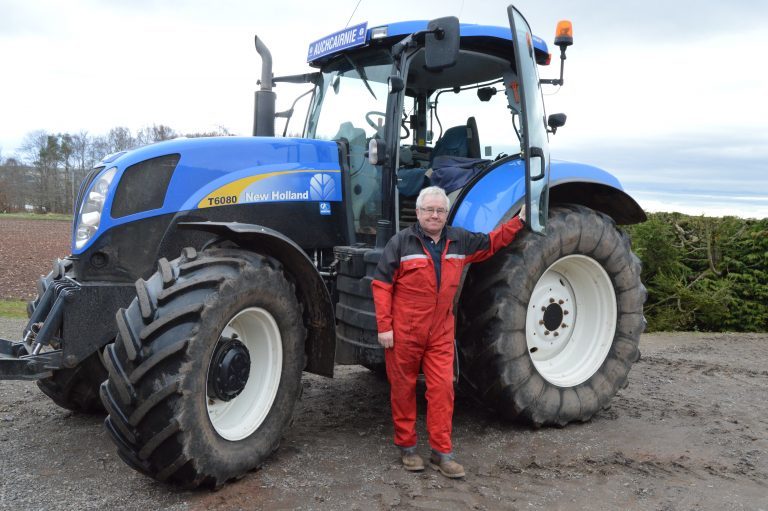
Farmers have been urged to follow strict procedures when working at heights to avoid severe injuries and even death.
Falls from height are the second highest cause of death in agriculture. Every year, at least eight people die across Britain as a result of falling from height, with many others suffering severe injuries.
Falls often happen from roofs, lofts, ladders, vehicles, bale stacks, and unsuitable access equipment, such as buckets, and even the most safety conscious farmers can experience the effects of a serious injury.
Ian Argo, a Scottish arable farmer at Auchcairnie Farm, Laurencekirk, dislocated his knee cap and severed tendons after he fell when coming out of his tractor “the wrong way”.
Like many farm accidents, it was a routine task that Ian had done many times.
For years he had been climbing out of the tractor “the wrong way”, effectively front facing.
However, on 12 September 2013, for a reason unknown to him, he fell.
‘Wrong way’
Ian found himself lying on the ground after getting out to fill up the tractor with diesel at the end of the working day whilst working for a neighbour.
Ian, who farms in partnership with his son Steven, wife Alison and mother Edith, said: “I got out of the tractor, effectively the wrong way and the next thing I know I was lying on the ground.
“I’m not sure whether I slipped or tripped, it happened so fast and I can just remember lying on the ground.
“At the time I was working alone and I tried to get up but couldn’t get my left leg to work.
“There was no blood and I wasn’t feeling any pain at that point, but I could see that my knee cap had moved significantly up my leg.
“I then tried to phone someone, however I soon realised that my phone was in the tractor cab and there was no way I could reach it.”
Ian added: “The diesel tank was around 50 yards from the house, and I could hear voices coming from there, so shouted.
“Thankfully there was someone nearby that could hear me otherwise I would have been in bigger trouble.”
Ian suffered serious injuries to his knee cap and tendons. He ended in hospital for around four days, and then had an operation.
Overall, he spent just over a week in hospital and following that he had his leg in a brace frame for three months, attending hospital every couple of weeks to have it adjusted.
“I couldn’t drive for a number of months and I had to change my car to an automatic to make it easier,” Ian said.
“I was off work for six months but managed to get back in time for the spring work starting.
“We had to get someone into help my son Steven with the potato lifting, but thankfully they weren’t required over the winter months.
“I’d underwent a few months of physiotherapy which has helped in the range of movement I now have in my leg,” Ian added.
‘Learning curve’
The accident has made Ian more aware of coming out of tractors the correct way, and he said that he hopes it has been a learning curve for his son of how accidents can happen so easily.
Ian added: “I want to highlight the impact an accident like this can have on your family and your business.
“We’re much more conscious of safety all the while on the farm now and it’s made me slow down and think about every process.”
This case reinforces that fact that farm workers of any age run the risk of injury or death from falls.
Falls constitute one of the most common farm accidents, accounting for 23 fatal accidents in the last five years.
Safety measures
Farm Safety Partnership Scotland is laying out measures to follow for safe working practices at heights, whether that is on roofs, stacking or loading bales, ladders or when using forklifts, for example.
This includes:
• Avoid roof work or work at height maintaining buildings. Do as much as you can from the ground for example, use extending equipment to clear gutters.
• Avoid doing the work yourself. Where possible use a professional contractor with the knowledge, skills equipment and experience to safely work at height on buildings.
• On very rare occasions where roof work or building maintenance at height cannot be avoided make sure the work is planned and carried out by people with the right training and equipment.
• Don’t be tempted to use the wrong equipment. Being lifted on the forks or bucket of a telehandler is illegal.
FSPS, which consists of key industry stakeholders, will be focussing on different types of farming activities each quarter to deliver key messages and encourage those working and living on farms to take action.
Last year alone there were 33 deaths in the agricultural industry in Great Britain. The most common causes of death and injury in the agricultural industry continues to involve falls, transport, animals and equipment.
